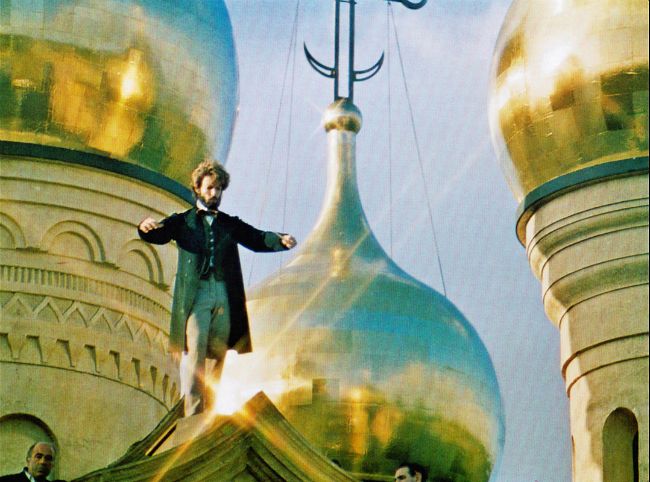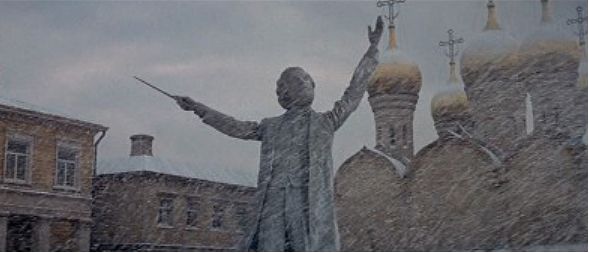
Tchaikovsky in Music Lovers during a fantasy sequence of aerial conducting
Richard Chamberlain (himself a homosexual) as Tchaikovsky in one of the memorable moments of the film. The grand globes of the Russian Orthodox church frame this fantasy shot of Tchaikovsky, who swirls around conducting some imaginary symphony.
The scene is at the end of the film, and was shot at Bray Studios, near Windsor, England. The golden domes of the Kremlin were built on the backlot.
This image "freezes" into a statue as the film ends, giving is that moment for eternity.

Imagine going to so much trouble to orchestrate these scenes!
-------------------------------------------------------------------------------------------------------------------------------------------------------------
Ken Russell has made a grand film on Tchaikovsky titled The Music Lovers. It vacillates between the sublime and the horrific. Images of beautiful Russian architecture and interiors are juxtaposed with crass sex scenes and characters (Tchaikovsky's mother, for example) rotting on their death beds. The film's director seems to think that these ugly images constitute drama, and scripts the score with Tchaikovsky's grand oeuvres. The more delicate scenes are honored with softer works.
I watched the whole film, both fascinated and horrified (I switched channels a couple of times), but I was also enchanted by its beauty. This was clearly a clever, sophisticated trick to pull me into the sublime evil of the film.
Roger Ebert agrees with me:
Ken Russell is a most deviously baroque director, sucking us down with him into his ornate fantasies of decadent interior decoration, until every fringe on every curtain has a fringe of its own, and the characters have fringes, too, and the characters elbow their way through a grotesque jungle of candlesticks, potted plant stands, incense sticks, old champagne bottles, and gilt edges, and it is almost certain that something is happening in the movie. But what?But I think there is another reason for the film's descent into horror. Tchaikovsky cannot allow him to view homosexuality as normal. Visions of horror keep escaping through the beauty he's trying to capture.
Video of Jennifer Roback Morse of the
National Organization for Marriage’s Ruth Institute
speaking at a Catholic Women’s Conference.
in Venice, Florida on February 2013
Her speech is titled "Defending Marriage."
Tchaikovsky is said to have died of cholera, although some attribute his death to suicide. I tend to believe the latter. It was his only out, other than to renounce his sins, beg for, and wait for, forgiveness. And live his life as piously as he could after that. But with stubborn and strong-willed men, who have defied and rejected God for so long, waiting for God's answer would seem longer than eternity, and his own swift hands would send him to the eternity that seems shorter to him.
One commentator somewhat agrees with me. It was not Tchaikovsky who took his life, it was his family which influenced him to take arsenic and end his life:
Quite contrary to the ridiculous myth that he drank a glass of unboiled water in order to contract cholera, thereby committing suicide, strong evidence suggests that he was forced to take arsenic as a matter of honour: one of his sexual adventures with a boy of noble birth so outraged the boy's father that Tchaikovsky's dalliances were in danger of being brought to the attention of the Czar, thus bringing dishonour to the school where Tchaikovsky trained as a civil servant. A sort of trial was held by about a dozen of his former classmates, now holding high positions in government and law. He was presented with two choices: have his indiscretion revealed to the Czar (a letter had been written but had not yet been delivered), or commit suicide through taking arsenic.Perhaps it is this attempt at expiation, however coerced, that allows us to appreciate and admire Tchaikovsky's music. The world of Western art is full of such ambiguous characters. The beauty that they try to capture is tainted with sin. It is the arrogance that we think we can create as well as God which exposes our weakness, and our achievements become hostage to dangerous forces.
Here is the soundtrack for The Music Lovers
"Polovtsian Dances"
from "Prince Igor"
Composed by Alexander Borodin
"SCHERZO BURLESQUE"
Conducted by André Previn with London Symphony Orchestra
"DANCE OF THE CLOWNS"
Conducted by André Previn with London Symphony Orchestra
"PIANO CONCERTO IN B FLAT MINOR"
(slow movement)
Piano soloist: Raphael Orozco
"THE LETTER SONG"
from EUGENE ONEGIN
Vocalist: April Cantelo
"6th Symphony"
(excerpts)
Conducted by André Previn with London Symphony Orchestra
"MANFRED SYMPHONY"
(excerpts)
Conducted by André Previn with London Symphony Orchestra
"STRING QUARTET No. 3"
(adante)
Conducted by André Previn with London Symphony Orchestra
"ROMEO AND JULIET"
(overture)
Conducted by André Previn with London Symphony Orchestra
"MINIATURE MARCH"
Conducted by André Previn with London Symphony Orchestra
"1812 OVERTURE"
Conducted by André Previn with London Symphony Orchestra
Tchaikovsky-Piano Concerto no. 1 in b flat minor op.23
-------------------------------------------------------------------------------------------------------------------------------------------------------------
Posted By: Kidist P. Asrat
-------------------------------------------------------------------------------------------------------------------------------------------------------------
